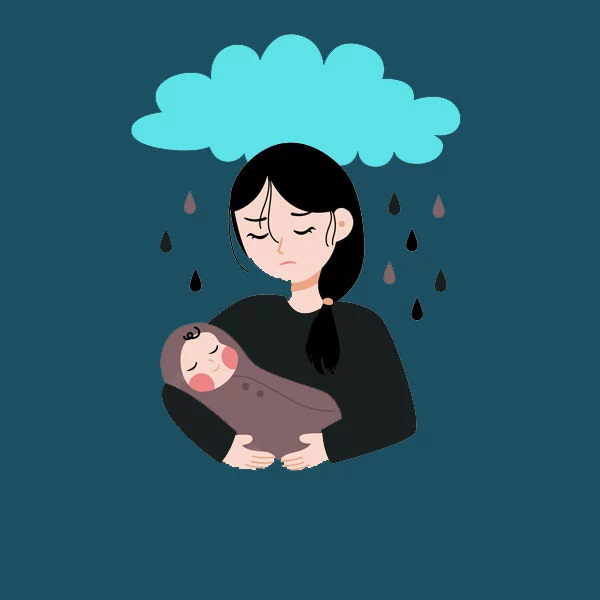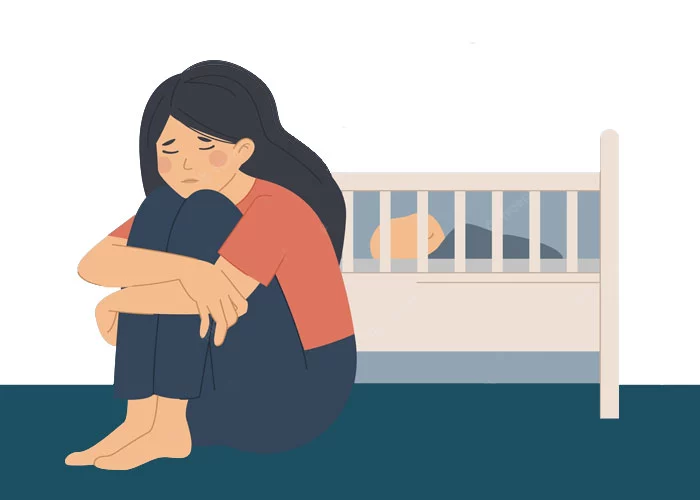
Having a baby is one of the most beautiful times in life, but it can also be one of the saddest times. Most of the new mothers, in the first days after giving birth, experience mood swings and in exciting moments of joy and happiness, they are suddenly disturbed by an influx of depression symptoms such as crying, anxiety, anger and sadness. This postpartum grief usually reaches its peak in the first 2 to 5 days after delivery. Of course, most women recover as quickly as they had it. But sometimes, this problem is not solved. This is where the diagnosis and attention to postpartum depression becomes seriously important. We want to talk about the prevalence, symptoms, diagnosis and treatment of postpartum depression as well as father’s depression after the birth of a baby and the complications of not treating this disorder.
read more : what is depression
?What is postpartum depression
Postpartum depression is a depression disease that affects 10 to 15 women out of 100 women who have a baby. Its symptoms are similar to those of depression at other times. which includes low mood and other symptoms that are endless for at least two weeks. Depending on its severity, you may find it difficult to take care of yourself and your baby. Simple and easy tasks may seem difficult to you.
Sometimes there is an obvious reason for postpartum depression, but not always. You may feel distressed or even guilty because you expect to be happy with the baby. However, postpartum depression can happen to anyone and it is not your fault. It’s never too late to ask for help. You can get better, even if you have been depressed for a long time. The help you need depends on the severity of your condition. Mild postpartum depression can be treated with increased support from family and friends. If you have severe postpartum depression, you will need psychiatric help.
Symptoms of postpartum depression

Symptoms usually begin within the first 4 to 6 weeks after delivery, but may begin earlier, during pregnancy, or later, up to a year after delivery. Its signs and symptoms include the following :
- Despair
- feeling worthless
- feel embarrassed
- Decreased ability to think clearly
- Disturbance in concentration
- learning disorder
- Impaired memory or decision-making
- restlessness
- Severe anxiety or panic attacks
- Thoughts of harming oneself or the baby and recurrent thoughts of death or suicide.
- Excessive anger or irritability
- Fear of not being a good mother
- Low mood or severe mood swings
- Intense crying and sometimes without a clear reason
- Difficulty in bonding with the baby (feeling close to the baby)
- Being away from family and friends or feeling rejected
- Loss of appetite or eating more than usual
- Inability to sleep or oversleeping
- Extreme fatigue or lack of energy
- Headache
- Heartache or blurred vision
- Decreased enthusiasm or pleasure in activities such as recreation, eating, self-care, and sex
How does postpartum depression affect my feelings toward my baby?
- You may feel guilty that your feelings are not as expected.
- You may or may not like your baby.
- You may not feel close to your baby.
- It may be difficult for you to understand how your baby feels or needs.
- It is possible that you suffer from your baby or blame him for your condition.
Do women with postpartum depression harm their babies?
Depressed mothers often worry that they might do this, but this is extremely rare. Sometimes, due to sheer exhaustion and frustration, you may feel like hitting or shaking your baby. Many moms and dads feel this way at times, and it’s not just for those with postpartum depression. Despite having these feelings, most mothers never do this. If you feel this way, share it with someone. Women often worry that if they tell anyone how they feel, their baby will be taken away from them. In fact, your doctor, health care provider, and midwife want to help you get better. This means that you can take care of your baby at home and enjoy it.
Why is treatment important?
Most women recover within 3 to 6 months without any treatment. One in four mothers with postpartum depression will remain depressed until their child is one year old. However, it can be very painful and distressing. Postpartum depression can ruin the experience of being a new mother. This can put a strain on your relationship with your child and your partner. You cannot take care of your baby as well as you can when you are well. Postpartum depression can affect a child’s growth and behavior even after the depression is over. So, the shorter the better.
What treatments are available?
You should be told about all the possible benefits and risks of treatment so that you can make the best choice.
Treatment includes the following:
- Psychotherapy
- Medicine
Psychotherapy
Talking about your feelings can be helpful, no matter how depressed you are. Sometimes, it’s hard to express how you feel to someone close to you. It can be easier to talk to a trained counselor or psychologist. Talking to someone about how you’re feeling can be comforting. It can also help you understand and feel your problems.
Medicine
If your depression is severe, an antidepressant may help.
There are different types of antidepressants. They all work well, but their side effects are different. All of them can be used for postpartum depression, but some are safer for breastfeeding than others.
Antidepressants take at least 2 weeks to start working. You should take them for about 6 months after you start feeling better.

